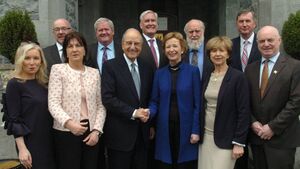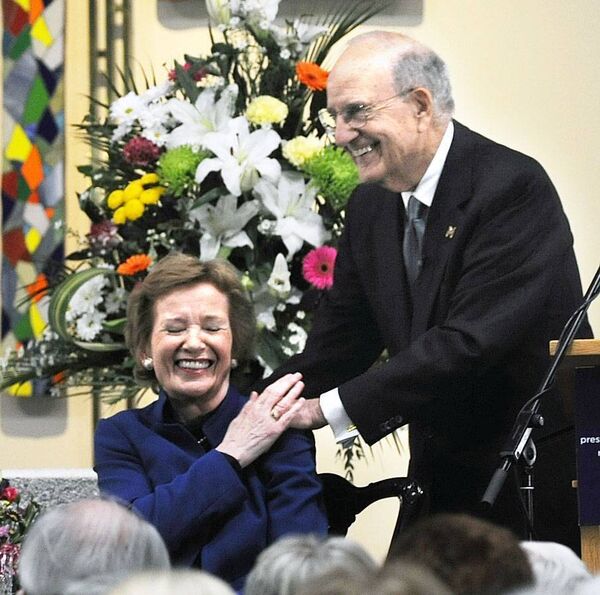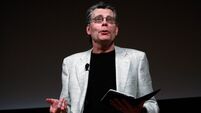Trying to go back in time just doesn't work

Former US Senator George Mitchell (front) and Canadian Ambassador Kevin Vickers (centre back) alongside members of the board of Victoria House Foundation at the Mary Robinson Centre's 4th International Human Rights Lecture in Ballina last week. Picture: Henry Wills Archive
In 2017, I was extremely fortunate to be in the presence of former United States Senator George Mitchell at Mount Falcon.
I like to claim it was a private audience, as that’s what it felt like. Myself and three other reporters were there with him and former Irish President Mary Robinson for a press briefing ahead of the fourth Mary Robinson International Human Rights Lecture in Ballina later that day. We sat in a small study in Mount Falcon and listened intently as a man who played such a huge role in bringing peace to our island enraptured us as he spoke about the modern world.
It was a privilege and in the course of half an hour Mr Mitchell spoke more presciently and eloquently than any other statesman or woman I’ve heard since. His comments are particularly relevant when contrasted with the current president of the USA.
It is the only press conference I was ever at that I printed out the transcript and refer back to regularly. It was an education. He was asked about the impact of Brexit and his answer was spellbinding. It is easy to see how he knocked heads together in the North and his comments resonate more and more with every passing year.
He spoke superbly on progression versus a wistfulness for an extinct past, which we have seen play out in the UK through Brexit and in the USA with Donald Trump’s slogan ‘make American great again’.
Mitchell was speaking in the wake of Brexit and in the second year of Trump’s first term. The eight intervening years have only served to accentuate the arguments he made which are really worth exploring.
“Two hundred and fifty years ago the Industrial Revolution began in England. There was widespread fear and anxiety that huge numbers of men would become unemployed as machines were created to replace men in the manufacture of goods. Not unlike today there was widespread opposition, there was some upheaval, some violence, some exploitation, some misery but over the following century as productivity rose dramatically, as new goods were invented, new services were provided, the entire economy of the United Kingdom rose and the standard of living of all the people rose.
“We’re now experiencing a revolution that I believe future historians will judge to be as significant as was the Industrial Revolution. It is a revolution driven by two forces: rapid technological and a dramatic increase in the movement of goods and people across national borders, triggered in part by the actions taken after the Second World War (alliances such as NATO and the European Union) in an effort to establish peace and stability and prosperity on a broadly shared basis. There are some who think the answer is to look backward, to try to recreate a mythical past. That’s true in the UK, that’s true in the United States, it’s undoubtedly true in every society that there are some who believe that. I believe to the contrary.
“That we have to embrace change, that we have to not only heed the knowledge that modern science provides to us but encourage even more such knowledge and harness it to our benefit. The real question is whether we can do so in a way that also mitigates the loss to those now tens of millions of people who are not beneficiaries of change but are victims of it. Everybody’s life has changed dramatically,” he said.
“If you go all the way back to the advent of democracy in Greek city states, there are always two forces, the forces that resist change, that yearn for a past that is seen through rose-coloured glasses and those who are willing to accept change. It is really those who accept modernity against those who want a return to the past.
“You can’t go backwards. I come from the state of Maine. We once had, in my part of the country, New England, a small and thriving industry in which many men were employed in the manufacture of stagecoaches and other horse-drawn carriages. There isn’t a single person employed in America in that industry today but no rational person will argue that we are worse off because the automobile was invented. But for the men and their families in those small towns where those stagecoaches were made, the loss is real, the pain is real.
“We have to figure out a way that those men, their families, are equipped to meet the challenges of the 21st century and benefit from technology. That is the real challenge of leadership in all societies and particularly in western democracies.”

He then picked up a colleague’s smartphone placed on the table in front of him which was recording his words.
“This single product, the smartphone has altered the rhythm of life for almost every human being on the planet. Every person in this room’s personal life, the way you live, has changed because of the invention of this smartphone. We’re not going to go back to a day when we didn’t have smartphones, what we have to do is figure out how to use them wisely to our benefit and figure out a way to meet the challenges I’ve described along with climate change, spectacular growth in population, primarily in areas that can now not even meet the current needs of the current population.
“Keep in mind that the single most important factor in population growth is the status of women. Where women are independent and fully empowered, population rates tend to stabilise. Where they are not, rates grow and that’s happening across a wide swathe of Asia and Africa and that’s triggering these mass movements of people seeking opportunities in democratic and open societies like Ireland, like the other European countries, like the European states and so these are enormous, enormous challenges.”
It is fair to say that George Mitchell stands in stark contrast to the man currently holding the office of the president of the USA.
When you strip away the extremely undesirable aspects of Donald Trump’s character such as his derision of opponents and people he doesn’t like, his misogyny, his arrogance, the contempt he has for his office and look at his political outlook (political philosophy would be too grand a term), what you have is what George Mitchell spoke of in 2017 as someone hostile to change, seeking to go back to a mythical past.
We have seen it with his rhetoric on tariffs, his disgraceful pulling of USAID funding, his ‘anti-woke’ crusade, his attitude to immigrants (despite his own immigrant roots) and so much more.
Are these strongly held views Trump has? I am not so sure. It is very hard to assume benign intentions in anything he does. I am inclined to think he is using such rhetoric to play to his voter base, to stoke fears and get the power base he requires. The role of President of the US appears to be a big plaything for Trump and people are being played.
Mitchell says we must embrace change but, crucially, not be ignorant to those negatively impacted by it. Trump has a polar opposite view.
Mitchell speculated in 2017 that future historians will see this era as important as the Industrial Revolution. We’re definitely through the looking glass on that one now.





